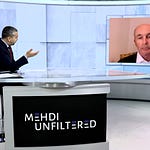Do you ever wonder where the world will be in 50 years?
This is the key question that award-winning filmmaker Asif Kapadia – best known for his films ‘Diego Maradona’, ‘Amy’ and ‘Senna’ – seeks to answer in his newest work, ‘2073.’ And the answer is a lot scarier than perhaps the flying cars we imagined for the future.
‘2073’ gives us a look at just one of the possibilities if the world continues to devolve at its current pace. A world almost unrecognizable as citizens of ‘New San Francisco’ face the fall of democracy and the harrowing effects of climate change. (Be sure to watch the exclusive clip from the film at the end of the interview above.)
“I thought the whole world feels really dystopian – everything that happens every day that I read, everything I see happening around me – and I thought, how do I express this feeling, this fear about where we're heading?” Kapadia tells Mehdi.
He continues, “My main aim with this film was to kind of almost have a God's eye view of the whole world. Because my background is from India, I've worked in Brazil, I've worked in Europe, I live in the UK, I've worked in the US. I just saw the same kind of elements, the same playbook happening everywhere.”
Thus, ‘2073’ depicts the confluence of climate change and the rise of authoritarianism in the dystopian city of New San Francisco, where there’s no privacy, no freedom, no democracy. The film is a warning of what is to come if we let oligarchs go unchecked.
But it’s not all doom and gloom, because as much as ‘2073’ serves as a warning, it also is a call to action.
“The film is there to create a dialogue for us to be talking now, for you, for me, for everyone to be saying, what can we individually do? I don't think it's as simple as putting a neat little moment at the end of the film and saying, if you do this, everything will be great. I mean, the struggle is much more complex and the fight for freedom and democracy is much more layered than me just saying go out and vote. There's something else going on here and we're going to have to talk about it,” Kapadia explains.
He concludes, “I think partly it starts at home. It starts with you, starts with your kids, it starts with your family, your parents, your aunties and uncles, but then also a kind of wider community about what are we going to do to protect ourselves from what is happening. We're not crazy. This stuff is happening. And I think the film, part of the process of showing it, has been almost therapy for people.”
Watch the full interview above to hear what Kapadia’s take is on the mainstream media’s coverage of the issues he highlights in ‘2073’, and the exclusive clip, only for Zeteo paid subscribers













